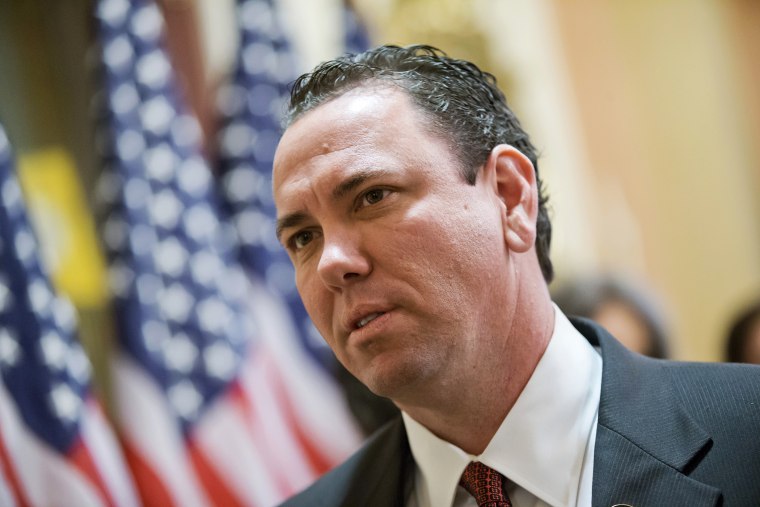For a guy who's only held elected office for eight months, Rep. Vance McAllister (R-La.) has had quite a career, hasn't he? It was just last November when the Louisiana Republican unexpectedly won a congressional special election. By April, reports surfaced that McAllister was caught in an extra-marital kiss with a staffer, forcing the Republican establishment to turn on him with a vengeance.
Soon after, the GOP lawmaker said he would not seek a full term, only to walk it back two weeks later.
Whatever his future holds, McAllister is showing some unexpected candor about campaign financing.
Rep. Vance McAllister (R-La.) was franker than most lawmakers, when he admitted last week he expected to receive a campaign contribution after he voted against a bill. The congressman, perhaps best-known for getting caught on tape kissing a staffer and returning to Congress despite vigorous calls for his resignation from Louisiana GOP leaders, said he was relaying the advice allegedly given to him by a colleague in the House as a cautionary tale of how "money controls Washington," according to The Ouachita Citizen.
According to McAllister, an unidentified colleague said he could expect to parlay a vote on a bill related to the Bureau of Land Management into campaign donations.
The unnamed House Republican reportedly told McAllister, "Vote no, and you will get a $1,200 check from the Heritage Foundation. If you vote yes, you will get a $1,000 check from some environmental impact group."
According to the story, the Louisiana Republican went back to the unidentified lawmaker later. "I voted no, and I didn't get a Heritage Foundation check, but he did," McAllister said. "I went back and checked with my friend, 'I didn't get a check, man. What were you talking about?' He told me, 'Well, I got one. Why didn't you?'"
As McAllister sees it, he was denied the money because the party establishment has turned on him.
It's not clear, however, whether this colorful story is true.
For one thing, the Heritage Foundation doesn't make campaign contributions. Indeed, it can't -- it's a tax-exempt group, legally prohibited from intervening in campaigns. That said, Heritage has a spinoff PAC, which the congressman might have been referring to.
For another, there's no obvious bill related to the Bureau of Land Management that's come to the House floor in recent months, though maybe he was thinking of different legislation.
That said, it'd be interesting to hear more from other House Republican lawmakers -- or perhaps, former House GOP lawmakers -- on this subject. Just how many members make cost-benefit analyses, in a campaign-finance context, when deciding how to vote on a bill? How common is it for members to cast votes with specific expectations about campaign cash?
McAllister made it sound like this kind of casual corruption is common. I suspect he was exaggerating a bit, telling a colorful story for effect -- he was sharing anecdotes at a meeting of the Northeast Chapter of Louisiana CPAs -- but it'd be interesting to hear from others on this.
